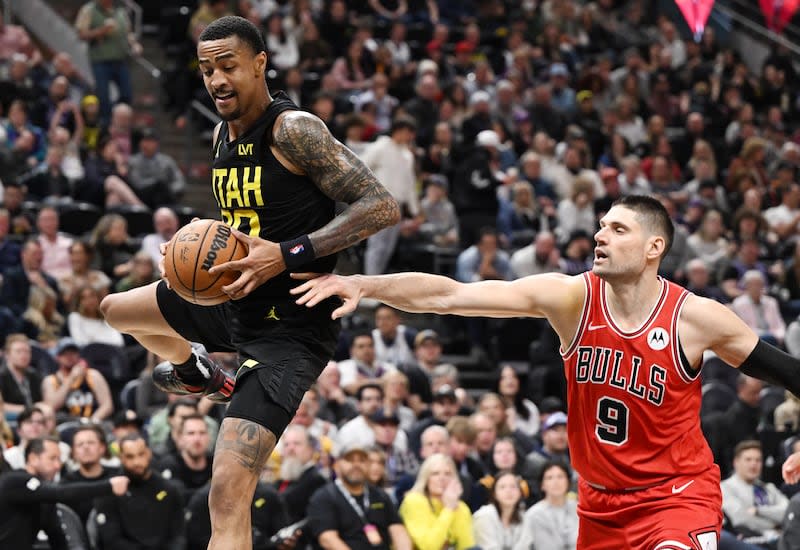Grading the Jazz: John Collins needed time to adapt to a new situation

Editor’s note: Sixth in a series of stories grading all the Utah Jazz players from the 2023-24 roster.
The Utah Jazz made one major move in the 2023 offseason and that was trading to acquire John Collins from the Atlanta Hawks. They didn’t have to give up much in the deal — Rudy Gay, who ended up retiring, and a future second-round pick.
It was clear that Collins’ time in Atlanta had run out. He was treated as a redundancy on the roster, his shooting numbers had plummeted and his $25 million per year contract was not looking good. From the Jazz’s perspective, early in the rebuilding process, kicking the tires on Collins made a lot of sense.
As an above-the-rim player, who could theoretically shoot the ball, the thought was that he gave an already tall roster (with Lauri Markkanen and Walker Kessler) an even more potent addition. But how did it all work out? Well, that’s not exactly an easy thing to answer.
John Collins — B
In the first couple of months of the season, I probably would have graded John Collins with a D. It was clunky and messy, the Jazz’s spacing was awful when Collins and Kessler were on the court together and the Jazz’s numbers were far better with Collins off the court than they were with him on the court.
But it is really important to remember that even some of the best basketball players need time to adapt to new surroundings. It took Mike Conley a year and a half before he really started to feel like he had the feel of things in Utah and it took him time last year to get into a groove with his new team in Minnesota. And if we’re looking at Minnesota as an example, look no further than Rudy Gobert, who needed a full season to really find himself with the Timberwolves (and now he’s a four-time DPOY with one of the best teams in the Western Conference).
Collins spent the first six seasons of his NBA career in Atlanta, and it was a real shock to the system when he realized that he was no longer needed or wanted there. Then he ended up in Utah, where he wasn’t used to anything or anyone and, on top of it all, he was in a situation where he knew that winning games was not a priority. That’s a huge change.
But as the season progressed, a lot of things became really clear. Collins needed time to acclimate and the more time he had, the more things started to get easier for him. The ever-changing lineups certainly didn’t help the situation, but Collins navigated it all with a pretty good attitude.
It also became very apparent that Collins cares deeply. He wants to prove that he can still play, that he’s still valuable, that he is a good teammate and an asset. He wants to do the right things for the team, which is really worth something, because there are players in the NBA that care a lot more about themselves than they do the success of the team.
It was also clear pretty early on that Collins’ shooting stroke was not a thing of the past. He finished the year shooting 37.1% from 3-point range, his best mark since the 2020-21 season. And although he isn’t as bouncy and explosive as he was in his early 20s, at 26 years old, he’s still a huge lob threat and can make defenses pay if they’re sleeping in the paint.
The one thing that still remains to be seen is if the Jazz can find a way for Kessler and Collins to play together. That kind of size would give the Jazz a huge advantage. I think that there was a little bit of subconscious resistance from both Collins and Kessler this season that didn’t help matters as Collins was navigating the new situation and Kessler was navigating some second-year struggles.
Collins averaged 15.1 points and 8.5 rebounds this season with the Jazz and did so efficiently and effectively. Defensively, Collins was much better at the end of the season than he was at the beginning, but there is still room for improvement there, to be sure.
Importantly, Collins turned into someone that could be relied on in the locker room, especially by the rookies. He is a good mentor, he’s jovial and he gets along with everyone from Markkanen and Jordan Clarkson to Kris Dunn and Keyonte George and everyone in between. Even when he was not picking up on things early in the year, Jazz coach Will Hardy found that it wasn’t for lack of effort or motivation or care; again, he just needed time.
It’s a good thing that Collins is under contract and is likely to remain with the Jazz, and I suspect that the consistency and familiarity will pay off for him in the future. As for the 2023-24 season, we saw him rebound from his darker days in Atlanta and show that he’s still able to perform at a high level.


